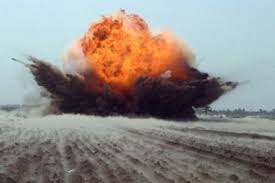Ukraine’s President Volodymyr Zelensky on Sunday signed a decree putting his war-torn country on track to leave an international anti-landmine treaty, according to a document published on his website.
Here is a breakdown of what this treaty is, why Ukraine is leaving, and what the implications are.
What is the Anti-Landmine Treaty?
The Ottawa Convention (also called the Mine Ban Treaty) is a global agreement created in 1997. Countries that sign the treaty agree not to use, make, store, or sell anti-personnel landmines.
Landmines are small bombs hidden in the ground. They can explode when someone steps on them, often hurting or killing people, including civilians, long after a war is over.
More than 160 countries have signed the treaty. Ukraine joined in 2005. But some big countries, like Russia, the United States, and China, never signed it.
Ukraine signed the treaty in 1999 and officially joined in 2005. At that time, Ukraine had over 6 million landmines, one of the biggest stockpiles in the world, including types like PMN and PFM-1 “Lepestok” mines from the Soviet era.
By 2020, Ukraine said it had destroyed almost all of them, keeping only a small number for training, as the treaty allows. Joining showed that Ukraine wanted to follow global rules and protect civilians.
Why is Ukraine leaving now?
Ukraine is at war with Russia, and this war has been going on for more than three years. President Zelensky said that Ukraine must do everything it can to protect its people and land.
In his Sunday address, President Zelensky said Russia has been using landmines a lot, in a cruel and careless way, and Russia never agreed to the treaty in the first place.
“Russia has never been a party to this convention and uses anti-personnel mines extremely cynically,” Zelensky said in justifying the decision.
“And not only now, in the war against Ukraine. This is the signature style of Russian killers — to destroy life by all methods at their disposal.
Zelensky said Ukraine was “aware of the complexities of the withdrawal procedure when it is carried out in wartime.”
“We are taking this political step and thus sending a signal to all our partners on what to focus on,” he added.
Confronted with the invasion, “Ukraine is compelled to give unconditional priority to the security of its citizens and the defence of the state,” Ukraine’s foreign ministry said in a statement.
It said the decision to withdraw was “difficult but necessary” in order to “protect our land from occupation, and our people from horrific Russian atrocities”.
Is this legal?
Ukraine is allowed to leave the anti-landmine treaty. The treaty has a rule that says any country can leave if it wants to. But the country must follow a legal process.
First, Ukraine has to send a letter to the United Nations (UN), saying it wants to leave the treaty. After that, it usually takes six months before the decision becomes official. That means Ukraine would still be part of the treaty during that time.
But there’s an important rule: if a country is in the middle of a war when the six months are up, the withdrawal is put on hold. In other words, Ukraine’s decision to leave might not take full effect until the war with Russia ends. This rule exists to stop countries from leaving the treaty just so they can use landmines during a war.
Who else is withdrawing?
Ukraine is not the only country making this decision. Some other countries nearby, like Poland, Finland, Latvia, Lithuania, and Estonia, have also said they might leave or stop following the treaty for now.
These countries are all members of NATO, a group of countries that work together for security. They live close to Russia and feel that they need to be ready for threats, so they think they cannot always follow the landmine ban.
What are the implications?
When Ukraine leaves the anti-landmine treaty, it could start using more landmines to defend itself. While this might help Ukraine fight better, it also means there will be more hidden bombs buried in the ground.
These landmines are very dangerous, not just for soldiers but also for regular people, including children. Even years after a war ends, these mines can still explode and cause serious injuries or deaths.
Landmines can also damage the land and farms. This makes it hard for people to grow food or rebuild their communities after the fighting stops. After a war, it takes a lot of time and effort to find and safely remove these hidden bombs so people can live without fear.







